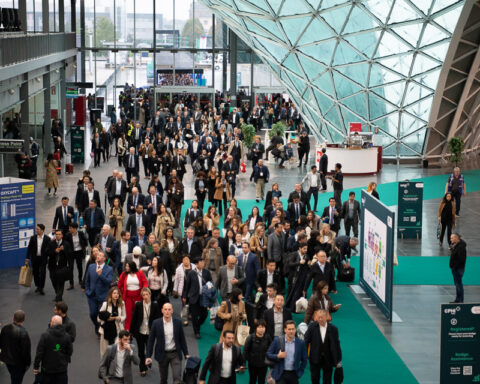Bio capacity in Europe is predicted to overtake the USA by 2020 according to the bio findings of CPhI Annual Report released live at bioLIVE in Madrid (9-11, October 2018) – adjacent to CPhI Worldwide.
The report’s analysis is from CPhI Annual Report expert, Dawn Ecker – Consultant and bioTRAK® Database Manager with BPTC (BioProcess Technology Consultants) – in which she looks collectively at the overall growth in demand and capacity for biologicals over the next 5-years. Europe’s capacity is shown to be growing the fastest and will overtake the USA by 2020 – rising from around 1100L to nearly 2200L within the next 5-years.
Globally both demand and supply are predicted to rise quickly, with demand slightly outpacing capacity expansions. This is forecast to result in an easing of capacity constraints in the short-term, but in the long-term, smaller companies may have difficultly accessing the capacity they need as products progress through the clinical pipeline – even in 2020 the majority of supply will remain at branded facilities (rising to 35% from 30% in 2017).
In 2017, the annual volumetric requirements were just over 2,300 kL, while in 2022, the volumetric requirement is projected to be just over 4,300 kL, a 5-year growth rate of nearly 14%. However, mammalian cell culture supply is around 3,700 kL and it will grow to approximately 5,600 kL by 2022, a 5-year growth rate of around 8%–Ecker
Interestingly, it appears that a two-tier market is beginning to open-up with 55% of 2020 capacity being prospectively met by single reactors of 2000 or 5000L capacity, which perhaps sheds light on the recent trend towards single-use technologies in biopharma development. However, some 45% of future capacity will require reactors with volumes of 10,000L or above. If two or three 2,000L bioreactors are used up to 60% of the products in development could be met using just 2000L capacity reactors.
In terms of areas of potential variance in overall capacity, Ecker identifies a continued focus on orphan drugs leading to lower overall capacity, or slightly higher should Alzheimer’s drugs and PDL/PDL-1 checkpoints in cancer get approved – shifting demand much higher and potentially leading to capacity shortages.
Ecker concluded: “In recent years, we have noted that the industry was experiencing some capacity constraints at the clinical scales due to very high clinical demand and the industry has responded in kind with a wave of facility expansions not seen in the recent past. The type and scale of capacity being installed will also be important as the demand for nearly half of products in mid-to-late stage development can be met with 5,000L of capacity or less; while the remaining half of products will need larger capacity to meet future demand. With new bioreactor installations mimicking the demand profile, we are keenly watching how the industry is responding to these demands for capacity as it is critically important to ensure current and future products are available to the patients.”
The full findings of the CPhI Annual Report were released at CPhI Worldwide – with over 45,000 industry executives and 2500 companies in attendance – and include 12 in-depth expert contributions, as well as the CPhI Manufacturing and Bio league tables.
Rutger Oudejans, Brand Director at UBM for bioLIVE added: “The new bioLIVE findings point to the industry entering a critical stage for overall biologics capacity. Dawn Ecker presented this live to attendees at bioLIVE, but I would encourage biologics professionals globally to study her analysis in the Annual Report, as these future capacity constraints and opportunities potentially have large implications for many products currently in clinical development, as well as biosimilars coming to market. What it also shows is that bioLIVE arrives at a key moment as Europe increasingly becomes the global centre for bioprocessing and manufacturing. In fact, many of the partnerships and meetings established here this week will be integral to helping meet this growing demand ”
About CPhI
CPhI drives growth and innovation at every step of the global pharmaceutical supply chain from drug discovery to finished dosage. Through exhibitions, conferences and online communities, CPhI brings together more than 100,000 pharmaceutical professionals each year to network, identify business opportunities and expand the global market. CPhI hosts events in Europe, Korea, China, India, Japan, South East Asia, North America, and the Middle East and Africa. Co-locating with ICSE for contract services; P-MEC for machinery, equipment & technology; InnoPack for pharmaceutical packaging; BioPh for biopharma; and Finished Dosage Formulation for every aspect of the finished dosage supply chain. CPhI provides an online buyer and supplier directory at CPhI-Online.com.








